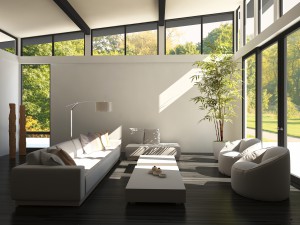Installing window film on new buildings or as part of a facility retrofit can be a smart way to achieve energy savings, reduce solar glare, increase occupant comfort, improve safety and security, and even enhance aesthetics.
But when searching for the right window film to meet their needs, building owners and facility managers have a lot of information – and even some misconceptions – to sort through.
Determining what exactly window film can do – and what it can’t do for your business or home – is an important part of the decision making process and it can sometimes be difficult to separate the myth from reality. First, we need some background.
What is Window Film?
Window film is a polyester product typically made of Polyethylene Teraphthalate (PET). Most films are applied to the interior surface of a glass window in a home, commercial building, or car, they also have a scratch resistant coating on the outer surface to protect the film.
There are many types of window films, including some that are clear and others that have multiple layers of PET to protect against shattering glass; others are tinted with pigments, metals, or dyes to reduce the amount of visible light transmitted through the glass and block heat. Decorative window films can replicate the look of frosted glass or etched patterns.
The decades-old perception of window film as a purple, peeling bubbly material seen on many cars in the 1970s is now a thing of the past. Today’s window films are high-performing, durable, and the result of continuing research and development.
Debunking myths surrounding window film
Window film doesn’t last very long
Some may think that window film does not last a long time. This not is simply not true. Many window film providers offer a warranty of up to 15 years for commercial film installations. Depending on the film type, glass type, window construction and the location of the building, some professionally installed window films can last well past their warranties. Most factory warranties will cover issues such as peeling, bubbling, rippling, cracking, adhesive failure, among others.
UV Solar film does not reduce solar heat gain
When the weather is warm, window film can reduce solar heat gain while still letting in natural light. UV reflective film can decrease air conditioning costs and save on lighting costs in your home or commercial business.
Solar film will not retain heat only reflect it
When it’s cold, solar window film can retain interior heat and save on heating costs. In existing commercial structures, the energy savings achieved by UV film can offer a payback of less than two years, or up to a 70% ROI (depending on factors such as construction, location, and type of solar film used).
Window film can be a panacea for storm protection:
Security window film when properly installed and anchored in commercial window frames will meet blast mitigation standards. The highest storm test standards out there are Dade county for hurricanes. Luckily we don’t have that issue to worry about in Canada. Security window film will help protect residential and commercial windows in storm events but it will depend on the degree and type of security window film you have installed.
- It can help hold glass in windows together, thus helping to prevent shattering
- It can help prevent potential physical harm
- It can help prevent high winds from entering a structure
- It can serve as a passive protection in the event hurricane approved shutters or others systems can’t be installed prior to a storm.
Security window film is not the cure all but it is an excellent barrier to help get you through the storm.
UV reflective film will not protect your interior furnishings from fading:
While it’s practically impossible to eliminate all risk of fading, UV resistant film can block greater than 99 percent of dangerous ultraviolet radiation, which is among the factors that can contribute to fading. Other factors that result, in fading are visible light, heat and chemicals given off by carpeting and other components of a space.
Security window film prevents burglary:
This is another perception that frequently is misunderstood. Using security window films alone likely will not prevent an intruder from entering a building through glass. Instead, glass that has security film installed on it is designed to hold together, not shatter into fragments. This can potentially delay a burglar from entering quickly and, in some cases, cause them to reconsider and move on. It’s also important to understand that even if the shatterproof filmed glass can remain intact as a burglar is attempting to enter, the window’s framing system may not be able to hold together (which means there would be less of an intrusion-delay benefit).
Window film will cause glass to break
Window film does not cause glass to break, stress does. There a 5 different types of stress that can cause glass breakage:
- Thermal stress – From absorption of solar radiation
- Tensile stress – From the weight of the glass itself
- Mechanical flexing stress – From wind
- Impact stress – From flying objects (ex. hail, baseballs, etc.)
- Twisting stress — From building or window frame sagging or settling
The only stress type that can be heightened by the application of window film is thermal stress. In some cases, the installation of solar window films will increase the thermal stress on sunlit glass due the heat retention factors. This means that some windows are not good candidates for solar film. The below window types are not recommended for solar or UV film application:
- Single pane glass larger than 100 square feet.
- Double pane glass larger than 40 square feet.
- Clear glass thicker than 3/8 inch.
- Tinted glass thicker than 1/4 inch.
- Window framing systems of concrete, solid aluminum, or solid steel.
- Glass where sealant or glazing compound has hardened.
- Visibly chipped, cracked or otherwise damaged glass.
- Reflective, wired, textured, or patterned glass.
- Triple pane glass.
- Laminated glass windows
Window film darken the inside of your home or office
This is a very common misconception of window films. Often people think that solar window film and window tinting are too dark to be useful. This not true. Window film does not need to be dark to protect your home and valuables from the sun’s damaging rays. Our selection of high performance films have a minimal impact on the transmission of light into your home or business during the day and night. Modern and nearly invisible spectrally selective solar films reduce UV rays and heat without the reflective and dark qualities of traditional film.
Solar film will kill the plants in my home
People often think the UV solar film will prevent your plants from receiving adequate light. In most cases, if a plant is getting the proper light before the installation of solar film it will not be harmed by the affects. If a particular plant frequently wilts by the end of a sunny day it can actually benefit from the effects of UV film. The solar film application may cause delays in growth as the plant adjusts to the light change. To determine if your plants will be effected by the installation of window film, move the plant to a dimly lit area for a few days and monitor its growth.
Consider Window Film for you Business or Home
For facilities that are considering upgrading their windows or renovating their facility entirely don’t be deceived by these common myths, window film can achieve long-lasting improvements for your occupants and your bottom line. Understanding exactly what window film can or can’t do for your commercial facility or public building is an important first step in making the right decision.
















